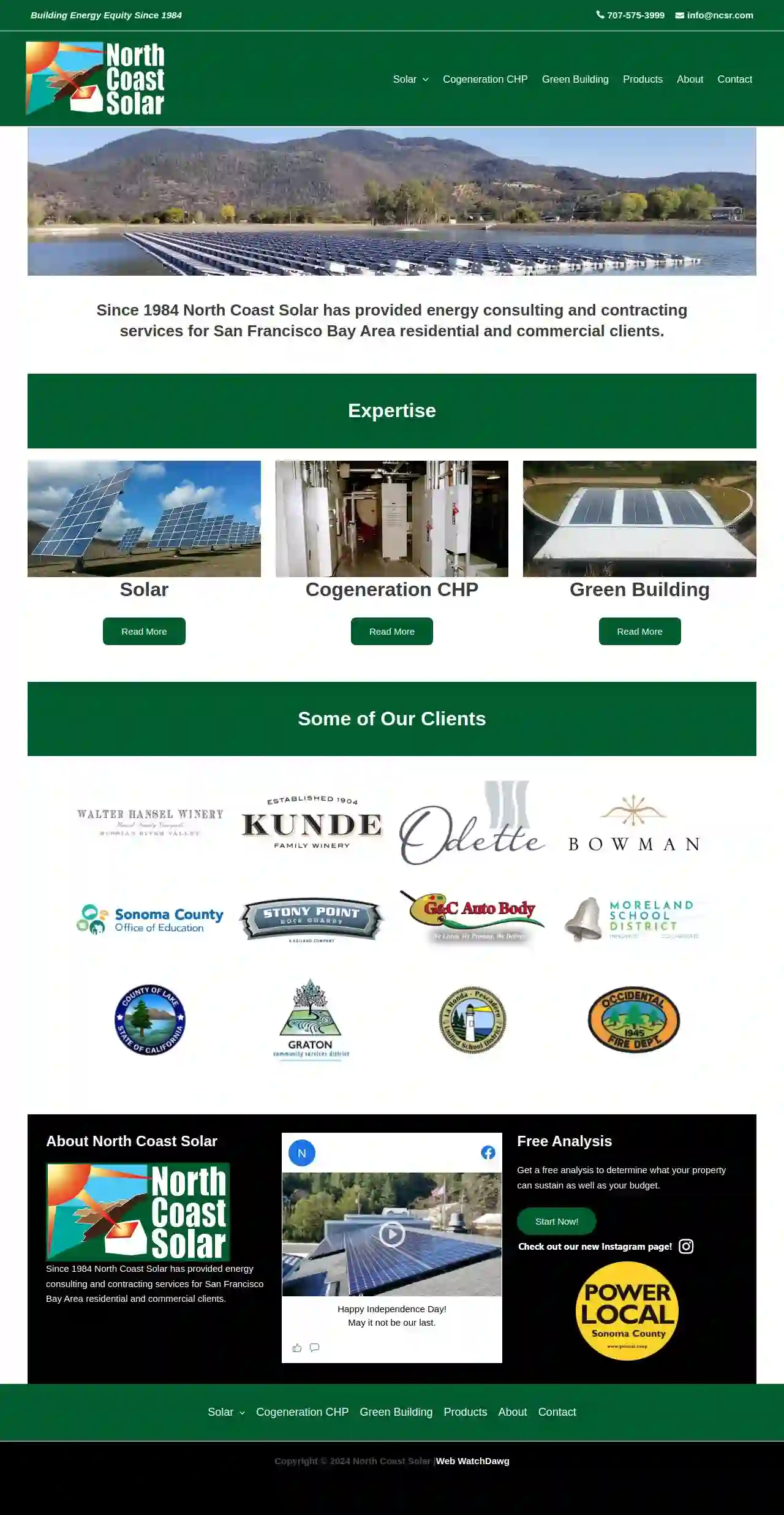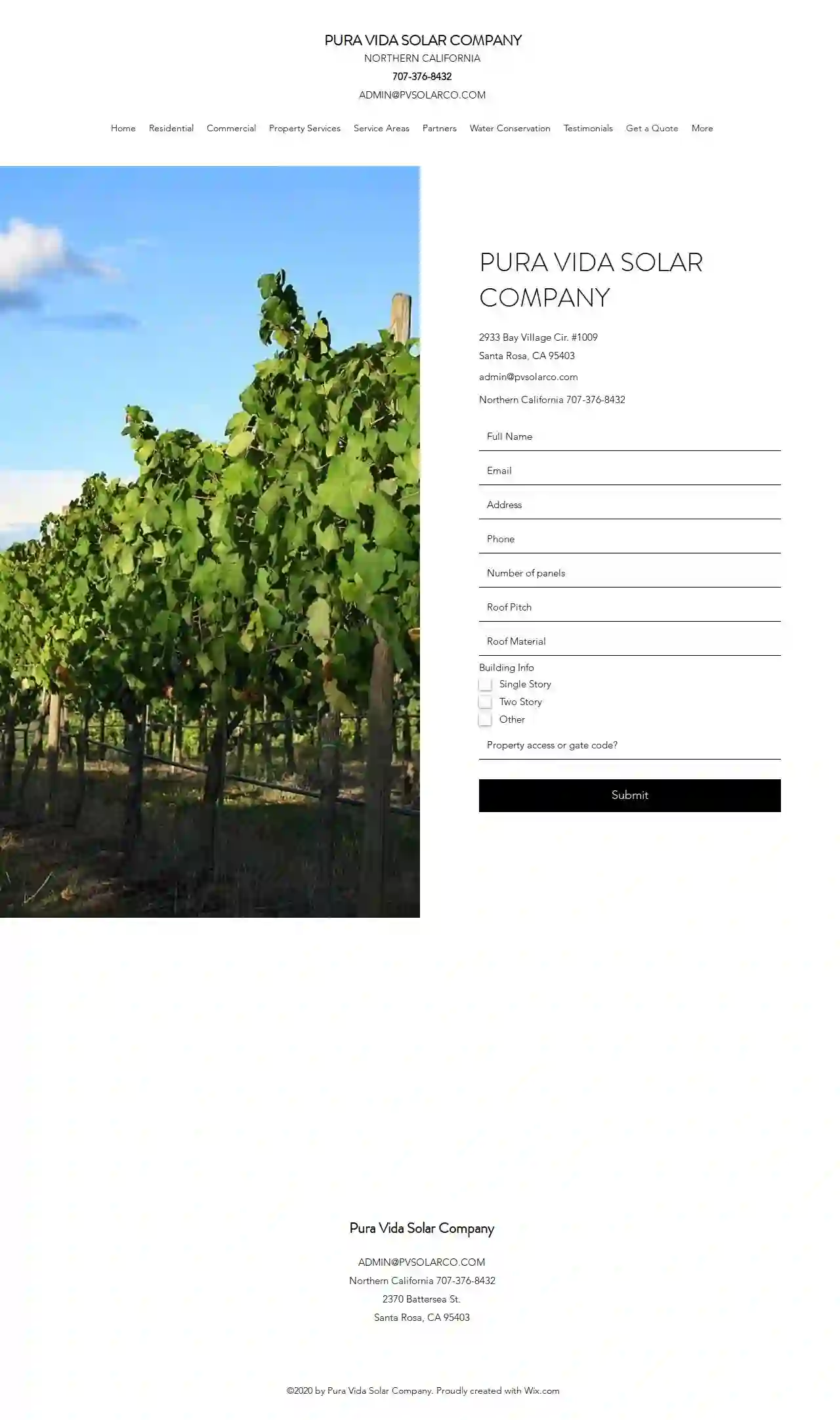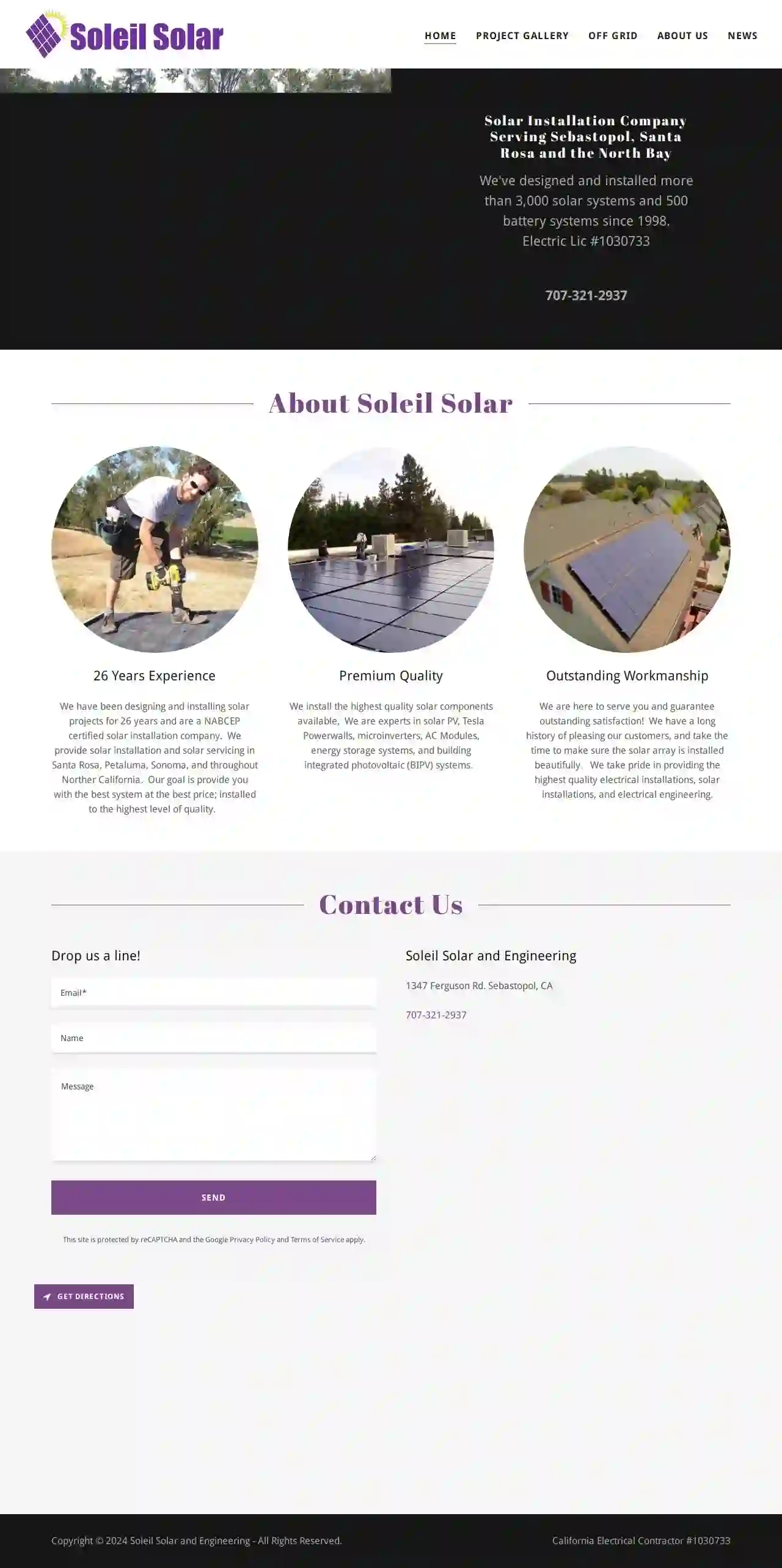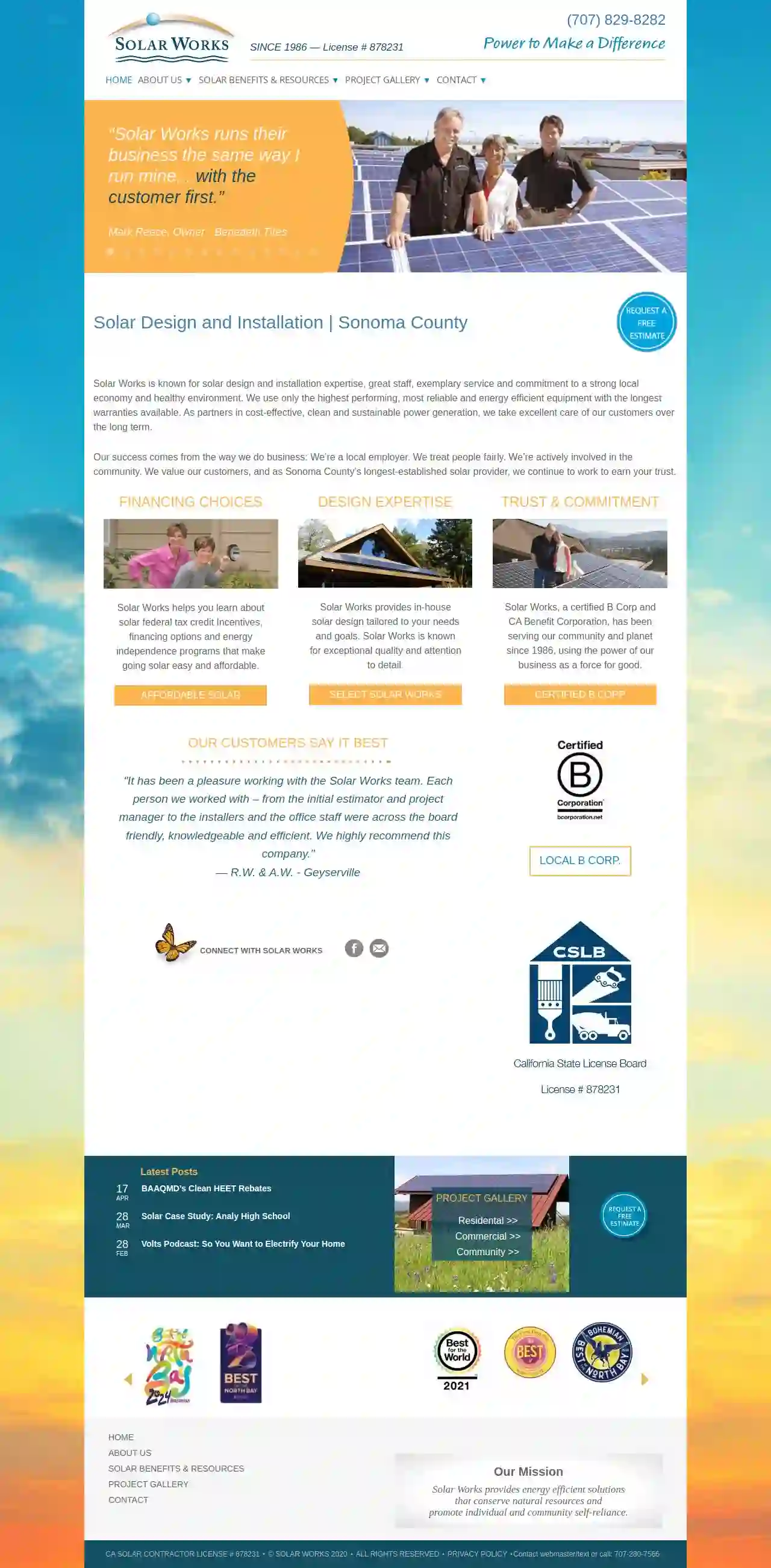Solar Panel Repair & Maintenance Santa Rosa
Find Solar Panel Cleaning in Santa Rosa
Get 3 FREE Solar Panel Maintenance & Repair quotes for your project today! Compare profiles, reviews, accreditations, portfolio, etc... and choose the best deal.

Suntegrity Solar
515 reviewsSanta Rosa, CA, Sonoma County, 95404, USSuntegrity Solar is a locally owned and operated Sonoma solar company that has been serving the North Bay, including Sonoma County, Napa County, and Marin County, since 1977. The company is dedicated to providing high-quality solar energy solutions, trusted advice, and outstanding customer service to the communities it serves. Suntegrity Solar is an Enphase Platinum Installer and REC Pro Installer, with over 800 solar systems installed since focusing exclusively on solar in 2009.
- Services
- Why Us?
- Accreditations
- Our Team
- Testimonials
- Gallery
Get Quote
Westcoast Solar Energy
3.56 reviewsWestcoast Solar Energy, 2975 Dutton Ave, Santa Rosa, 95407, USWestcoast Solar Energy is a leading provider of solar energy solutions in Northern California. Founded in 2009, the company has established a reputation for quality, longevity-based solar installations and exceptional customer service. With a focus on providing better solar equipment at a similar cost, Westcoast Solar Energy offers a range of services including commercial solar installations, residential solar installations, operations and maintenance, and solar panel repair. The company's commitment to quality and customer satisfaction has made it one of the top solar companies in Sonoma County.
- Services
- Why Us?
- Accreditations
- Our Team
- Testimonials
- Gallery
Get Quote
North Coast Solar
1468 Funston Drive, Santa Rosa, CA 95407, 95407, USSince 1984 North Coast Solar has provided energy consulting and contracting services for San Francisco Bay Area residential and commercial clients.
- Services
- Why Us?
- Accreditations
- Gallery
Get Quote
Essential Solar Services
3558 Round Barn Blvd, Santa Rosa, CA 95403, 95403, USEnergy Solutions We are a bridge supporting every person, business and community transition into Clean Energy and a sustainable economy. +Find out moreEssential Solar ServicesOur team works with developers, homeowners and businesses to provide an energy solution or service that works for you. Essential Solar Services (ESS) helps solar developers and contractors amplify, reduce and control administrative soft cost; design, permit plans, interconnection and SGIP rebate ability for your business. The affect that this is going to have on your company are going to exponentially exceed your objectives and goals. ESS also takes pride in helping homeowners, and businesses thinking about solar assess their solar potential, cost benefit, evaluate bids and make informative decisions of how to meet their energy goals. We are not an installer and can act as the owner's/investor's representative in design, equipment, contractor selection, and construction. Our services are designed to minimize risk and maximize the return of your energy investment. On average our clients see a 10% savings on initial cost alone when we are engaged and representing their needs to installers.
- Services
- Why Us?
- Accreditations
- Our Team
- Testimonials
- Gallery
Get Quote
Pura Vida Solar Company
2933 Bay Village Cir. #1009, Santa Rosa, 95403, USPura Vida Solar Company is a leading provider of solar solutions in Northern California. With a focus on sustainability and energy efficiency, they offer a range of services including residential and commercial solar installations, property services, and water conservation solutions. Their team of experts is dedicated to providing top-quality service and ensuring customer satisfaction.
- Services
- Why Us?
- Accreditations
- Our Team
- Testimonials
- Gallery
Get Quote
Solar Santa Rosa
4.915 reviews1791 Marlow Road, Santa Rosa, 95407, USSolar Santa Rosa is a local business that specializes in providing clients with a way to save money every month on their utility bill. They offer a fixed solar rate that helps to simplify budgets as utility rates continue to rise every year. Their mission is to light up homes and businesses with the boundless power of solar energy. They provide clients with a personalized service, ensuring customer satisfaction is their number one goal. Their streamlined process makes owning solar easy, involving contact, design, and installation. They use name brand solar equipment, including Tesla Powerwall and Enphase Batteries, and offer a 25-year warranty on their work.
- Services
- Why Us?
- Accreditations
- Our Team
- Testimonials
- Gallery
Get Quote
Soleil Solar
3.45 reviews1347 Ferguson Rd., Sebastopol, 95472, USSolar Installation Company Serving Sebastopol, Santa Rosa and the North Bay. We've designed and installed more than 3,000 solar systems and 500 battery systems since 1998.
- Services
- Why Us?
- Accreditations
- Our Team
- Gallery
Get Quote
Solar Sun Surfer
51 reviewsSan Francisco, CA, 123 Solar Street, 94103, USSolar Sun Surfer is a leading solar energy company dedicated to delivering high-quality solar installation services to both residential and commercial locations. With a focus on customer satisfaction and environmental sustainability, we offer a range of services including solar panel installation, solar water heating, and solar pool heating. Our team of experienced professionals is committed to providing efficient and cost-effective solutions to meet your energy needs.
- Services
- Why Us?
- Accreditations
- Our Team
- Testimonials
- Gallery
Get Quote
Sunrise Solar
54 reviews3347 Industrial Drive, Unit 2, Santa Rosa, 95403, USSunrise Solar is a leading provider of solar energy solutions in Santa Rosa, CA. With over a decade of experience, the company offers commercial and residential solar installations, aiming to help customers save on energy costs and contribute to a greener future. Their team of experts ensures a balance between aesthetics and energy yield potential, providing top-notch customer service and support throughout the installation process.
- Services
- Why Us?
- Accreditations
- Our Team
- Testimonials
- Gallery
Get Quote
Solar Works
4.821 reviewsSebastopol, Sonoma County, 123 Solar Way, 95472, USSolar Works is a full-service, locally owned and operated Sonoma County solar and electrical contractor, in business since 1986. Our work contributes to a healthy environment, strong local economy and self-reliant community.
- Services
- Why Us?
- Accreditations
- Our Team
- Testimonials
- Gallery
Get Quote
Over 4,210+ Solar Companies in our network
Our solar providers operate in Santa Rosa and surroundings!
SolarCompaniesHub has curated and vetted Top Solar Installers in and around Santa Rosa. Find a trustworthy pro today.
Solar Panel Repair & Maintenance FAQ
- Choose a Cool, Overcast Day: Avoid cleaning panels in direct sunlight or when they are hot, as the cleaning solution can dry too quickly and leave streaks.
- Use a Soft Brush or Sponge: Avoid abrasive materials that could scratch the panels. A soft-bristled brush or a non-abrasive sponge is ideal.
- Use Mild Soap and Water: A gentle cleaning solution of mild soap (dish soap) and water is usually sufficient. Avoid using harsh chemicals or detergents.
- Rinse Thoroughly: Rinse the panels thoroughly with clean water to remove any soap residue.
- Safety First: Be careful when working on your roof. Use a sturdy ladder and consider wearing a safety harness. If you are uncomfortable working on your roof, it's best to hire a professional.
- Using a Roof Rake: Carefully remove snow from the panels using a roof rake designed for this purpose. Avoid using abrasive tools or excessive force that could damage the panels.
- Hiring a Professional: If you are uncomfortable removing snow from your roof or if your panels are difficult to access, consider hiring a professional solar panel cleaning or maintenance company.
- Checking the Display: Most inverters have a display screen that shows real-time energy production, system status, and any error codes. If the display is blank or shows an error message, it indicates a problem.
- Monitoring Energy Production: Use your solar monitoring system (if you have one) to track energy production. If you notice a significant drop in output, it could be due to an inverter issue.
- Listening for Unusual Noises: Buzzing, humming, or clicking sounds from the inverter can signal a problem.
- Checking for Overheating: Inverters can overheat, especially in hot weather. If the inverter feels excessively hot to the touch, it may be malfunctioning.
Can I clean my solar panels myself?
How does snow affect my solar panels?
How long do solar panel inverters typically last?
How do I know if my solar inverter is working properly?
Can I clean my solar panels myself?
- Choose a Cool, Overcast Day: Avoid cleaning panels in direct sunlight or when they are hot, as the cleaning solution can dry too quickly and leave streaks.
- Use a Soft Brush or Sponge: Avoid abrasive materials that could scratch the panels. A soft-bristled brush or a non-abrasive sponge is ideal.
- Use Mild Soap and Water: A gentle cleaning solution of mild soap (dish soap) and water is usually sufficient. Avoid using harsh chemicals or detergents.
- Rinse Thoroughly: Rinse the panels thoroughly with clean water to remove any soap residue.
- Safety First: Be careful when working on your roof. Use a sturdy ladder and consider wearing a safety harness. If you are uncomfortable working on your roof, it's best to hire a professional.
How does snow affect my solar panels?
- Using a Roof Rake: Carefully remove snow from the panels using a roof rake designed for this purpose. Avoid using abrasive tools or excessive force that could damage the panels.
- Hiring a Professional: If you are uncomfortable removing snow from your roof or if your panels are difficult to access, consider hiring a professional solar panel cleaning or maintenance company.
How long do solar panel inverters typically last?
How do I know if my solar inverter is working properly?
- Checking the Display: Most inverters have a display screen that shows real-time energy production, system status, and any error codes. If the display is blank or shows an error message, it indicates a problem.
- Monitoring Energy Production: Use your solar monitoring system (if you have one) to track energy production. If you notice a significant drop in output, it could be due to an inverter issue.
- Listening for Unusual Noises: Buzzing, humming, or clicking sounds from the inverter can signal a problem.
- Checking for Overheating: Inverters can overheat, especially in hot weather. If the inverter feels excessively hot to the touch, it may be malfunctioning.